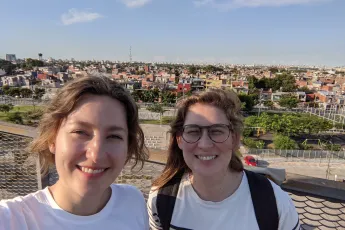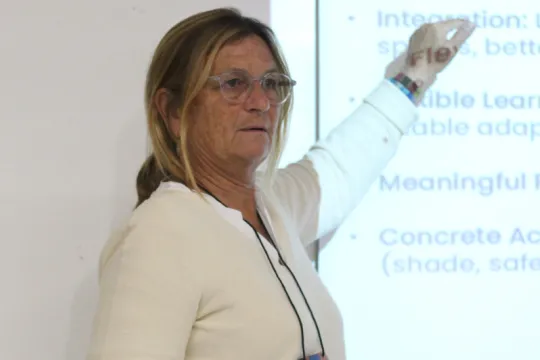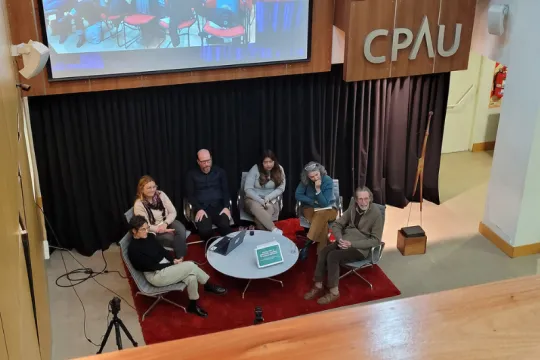
Flávia and Nathalie in front of an urban landscape in Buenos Aires. © Nathalie Saenger / UNU-EHS
Who: Dr. Flávia Guerra, Associate Academic Officer & Nathalie Saenger, Research Associate –Transformation Frameworks & Tools
When: 13 to 29 March 2023
Where: Buenos Aires, Argentina
Why: for Transformative Urban Coalitions (TUC)
Flávia and Nathalie conduct research for TUC. Its five Urban Labs in Mexico, Brazil and Argentina bring together communities to address local needs and help shift cities towards zero carbon emissions by 2050. The Urban Lab in Buenos Aires focuses on an informal settlement called Villa 20, which is currently undergoing a participatory re-urbanization process. The Urban Lab works to complement this ongoing process with new ideas, connecting decarbonization with efforts to tackle urban inequalities and advance climate justice.
What were your objectives for your field mission to Buenos Aires?
To better understand the effects of the TUC project and feed learnings back into the process, we have set up a system to monitor and evaluate its impact. We use various indicators like mindsets, governance, networks and capacities. We collect data through an annual survey, ethnographic research and interviews to track changes to these indicators. Selected interviews with Urban Lab members are conducted directly by UNU-EHS researchers each time we visit the field – which is at least once per year. This was the second time we interviewed Urban Lab members in Villa 20. Because of this personal format, we approach every interview as an opportunity for joint learning and capacity sharing between us and Urban Lab members. Being in the field helps tremendously in understanding the context of the people we work with and vice versa. Additionally, it is extremely valuable to see firsthand how local stakeholders perceive the progress of the Urban Lab. Fortunately, in Villa 20, people feel empowered and achievements are considered a collective success.
How do you notice the progress with mindset shifts among Villa 20 inhabitants?
Buenos Aires is an amazing city, but you also see a lot of inequality. When we arrived, citizens had just endured a heatwave that lasted for days, causing frequent power outages as air conditioning systems overloaded the electricity network. Everyone mentioned how hot it was and how they were hoping for rain soon. Heatwaves and droughts are becoming more frequent and intense in Argentina, and immensely impact the economy which is dependent on agriculture. In Villa 20, the effects of these extreme weather events are exacerbated due to existing vulnerabilities. Villa 20 significantly struggles with heat, partly because it lacks trees and shade.
During last year’s interviews, there was some resistance to discuss climate and environmental issues. Every day, Villa 20’s 30,000 residents deal with the harsh realities of poverty. Urban Lab members representing the community naturally felt issues such as food security, water provision and proper housing should be priorities over any other topic. This year, residents started to realize the multiple benefits of climate action, particularly nature-based solutions, to deliver solutions to their more pressing daily needs and improve living conditions. For example, by adding green spaces to the neighbourhood, residents reported feeling lower temperatures during the heatwave. Furthermore, being involved in decisions on how to make their community more sustainable also empowers people to be leaders in climate action. It gives them ownership over the project.
Thus, mindset shifts go hand in hand with physical changes. Compared to last year, we noticed the first TUC-led physical changes in Villa 20. The Urban Lab has been carrying out interventions in the area, relying on the implementation of nature-based solutions. As a result of these activities, both the community and local government bodies are starting to recognize the value of including climate narratives in their journey towards a more just city.
Can you give an example of how TUC helps create these mindset shifts?
We developed a card game that started off as an awareness-raising tool to introduce the topic of climate change, and how climate change intersects with social justice issues. It was created by a consultant for the Urban Lab in Teresina (Brazil) and worked so well there that we are now developing a version that is applicable to other local contexts. To see if the game works and raises awareness, we tested it in Buenos Aires. People were incredibly enthusiastic and it helped to build momentum for sustainability conversations in Villa 20. Playing the game with the community also helped us to understand that we needed to simplify it from a communication perspective, and that the aspect of winning the game greatly differed from observations we made when we tested it here at UNU-EHS. The community suggested that instead of “winning” the game, the goal should be about the group's collective effort to improve local living conditions while reducing emissions – a mindset that is crucial in creating a greener, more inclusive and sustainable city!

